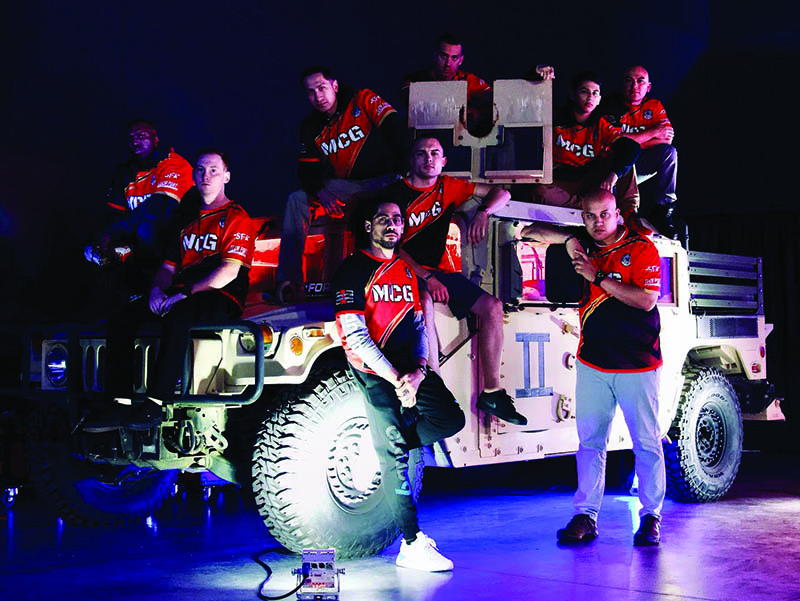
Marine Esports: Gamers Forge Bonds, Build Camaraderie Online
By: Briesa KochPosted on December 15, 2024
In this digital age, video games have become a more common pastime for many people. With newer technology, better graphics, game variety, as well as top-notch game development teams that constantly strive to improve and innovate new ways to enhance a player’s in-
game experience, it’s no surprise that “competitive gaming” has become something of a sport. Electronic sports, or “esports,” is a form of competition that uses video games as the playing field.
Esports include much of the same structure as traditional sports. There are leagues, professional teams and coaches. During tournaments teams can win trophies and cash prizes. In fact, some esports players can even gain sponsorships on streaming platforms like Twitch. Though not all of them are considered professionals, you can find “gamers” in nearly every community or organization you could think of, including the Armed Forces.
In May 2022, the military gaming community’s competitive drive was put to the test when the U.S. Air Force, in tandem with the Armed Forces Sports program, hosted the first ever Armed Forces Esports Championship in San Antonio, Texas. This tournament was marked as the first federally sanctioned esports competition, and the first gaming program officially adopted by the Armed Forces Sports program. The competition was held during FORCECON, a massive military gaming and technology event that celebrates the intersection of video games, technology and innovation. Marine Corps Gaming (MCG), an esports organization created by Marines, put together a team of Halo players along with a professional Halo coach to represent the Corps as they faced off against players from the Army, Air Force, Navy, Space Force and Coast Guard.
The game used as the playing field was Halo: Infinite, a team-based, science fiction first-person shooter (FPS) game that offers both single and multi-player experiences for its users. The tournament utilized Halo’s game modes “King-of-the-hill,” where each team’s goal was to maintain control of the objective at any cost, and “Team Slayer,” where the first team to reach 50 eliminations won the round. Scores were based on the number of rounds won or lost within a match, making teamwork and communication vital to move forward and compete against the next team.
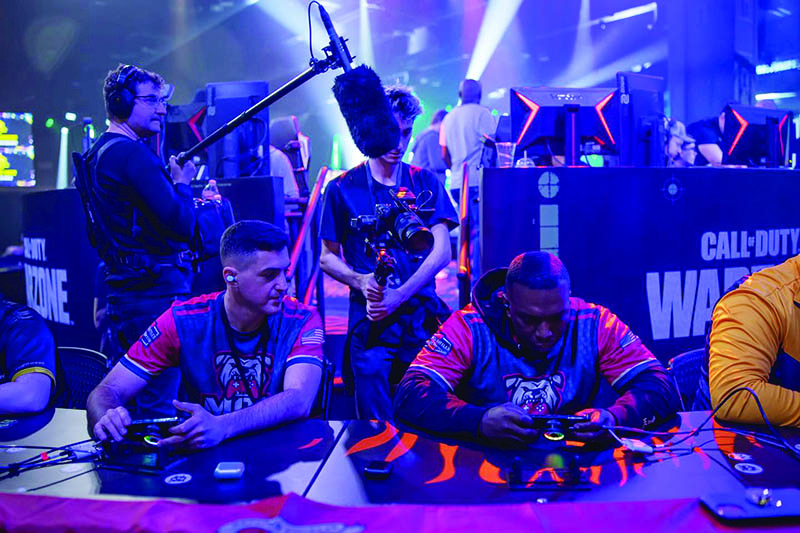
MCG placed third in the tournament overall after defeating the Space Force, Navy, and Coast Guard gaming teams. And though FORCECON’s all-service esports competition was the first time a group of Marines had participated in a large-scale gaming event officially sanctioned by the government, competing against peers, other services and allied forces is nothing new for Marines. But as gaming continues to grow, so does the need to create a space for the community of Marine gamers within the Corps. MCG works to build that community for its members, giving them a platform of their own, created by their own, with a mission to connect all Marines who share the Corps’ “fighting spirit” and have a passion for esports and video games.
After being founded conceptually in 2020, MCG officially hit the ground running in 2021, when they built a community platform utilizing Discord—a voice, video and text chat program that allows its users to create community servers that its members can use regularly. But having a community space didn’t serve much of a purpose without any Marines to occupy it. The next step was to broadcast MCG’s existence to any Marines who may be interested in joining.
“After that [the Discord] was established, we launched the website and reached out to every Single Marine Program across the service to spread the word. Additionally, we leveraged social media, word of mouth and in-person activations to share the community with Marines,” said Staff Sergeant Ian Mills, an imagery analysis specialist stationed at Marine Corps Base Quantico and current director of MCG.
After launching the organization’s official website later that same year, MCG has also established itself on other social platforms like Facebook, X (formerly known as Twitter), Instagram and LinkedIn, where they have amassed over 3,000 followers across all four sites. As their organization gains more traction, MCG hopes to continue building a more consistent presence on streaming and video platforms like Twitch and YouTube as they continue competing against other services and allied military esports teams. To do that, MCG develops teams that specialize in a specific game to represent the Corps at events. But in most cases, their selection system differs from that of esports organizations outside of the Armed Forces.
Professional esports organizations have a different team building structure than that of military esports groups like MCG. In most cases, esports organizations can choose to officially play as many games as they want, but each game played only has a small set of designated players called a “standing team” that specializes in one game. And much like in traditional sports, when a player is selected to play on a team, they sign a contract and join the organization as a “pro.” Similarly, these teams have substitute and alternate players who can take the spot of a standing team member if they were unable to play. In either case, those predetermined teams go on to participate in the annual tournaments for their specialty game. Tenure for members of these teams can last for long periods of time, especially if contracts are renewed, making the available spots for new players rare. But due to the volume of individuals associated with MCG and the organization’s purpose as a community hub, team selection requires a different approach.
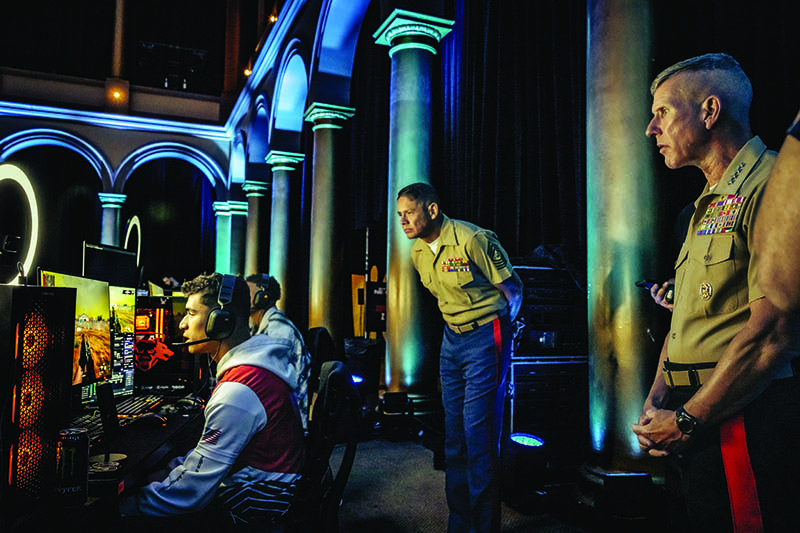
“Marine Corps Gaming really doesn’t have a standing team. We build teams as the requirement comes about,” said SSgt Mills. As a free-to-join, interest-based organization, any group of Marines who have formed or are interested in forming a team have a chance to compete at larger scale events. Marines meet, form teams and communicate with each other through the organization’s official server on Discord.
From there, MCG leadership posts announcements for events and gaming tournaments. Marines who have a team and are interested in competing can apply to play. If there is a large interest in one game, MCG holds a “qualifier” tournament, and the team that wins represents the Marine Corps as the current standing team for that event. “Marines also understand that they have to be in good standing. So, you can’t have any administrative issues, legal issues, any type of BCP or RCP. You have to be physically fit and mentally fit to participate. We still hold the same standards and want Marines to be at their best while competing at the highest level,” said Mills.
There are multiple national and international events that MCG attends like the Call of Duty (CoD) Endowment Bowl, presented by USAA, which raises funds to help veterans secure quality jobs after their service. MCG also regularly attends the United Service Organization’s (USO) Commanders Cup, which features teams from different services that specialize in Rocket League, an arcade-style vehicular soccer game. But gaming events and championship tournaments don’t exclusively determine what games Marines at MCG play. Though games like Rocket League, Call of Duty and Halo have a larger group of players, MCG still has Marines who play games like Overwatch, World of Warcraft and much more. Even Marines who are interested in competing individually through fighting games like Mortal Kombat and Street Fighter, or sports games like Madden or the NBA2k video game series, can compete if the need arises.
“We had two Marines competing in the USO Salute to the Service Madden tournament,” Mills said. “Those Marines got the opportunity to travel to Las Vegas to compete in the grand finals and won their respective brackets. With those winnings they won all expense paid tickets to bring a plus one to the Super Bowl. One of those Marines got PTAD during his deployment to go to the Super Bowl. So he was on ship, and his CO signed a letter to get him off ship to go.”
Marines at MCG are stepping up to the challenge and competing to win, not just during the tournament but also in the moments leading up to it. They are constantly preparing for the next event by running practice drills with fellow Marines and participating in scrimmages with civilian teams and sister services.
“They also have meetings; they go through field review. They’re treating this like a real-deal job,” said Mills. With guidance from the team captain and instructional support from the team coach, Marine esports gamers are learning how to improve positions, work as a team and be more aware of themselves and others to become an intimidating force that can put any opposing team’s skill to the test.

Though connecting through a shared interest in video games is at the heart of MCG, the organization offers more to its Marines than just the opportunity to compete. It also gives Marines the chance to lead. Staff Sergeant Zachariah Shanahan sets the example of discipline, commitment and leadership for his teammates as the captain of MCG’s Call of Duty team. After completing his duties as a formal school’s instructor during the day, SSgt Shanahan dedicates his free time to pursuing his passion for competitive gaming.
“I’ve been a fan of competitive Call of Duty for a very long time, and I’ve been playing games since I was a kid,” he said. “As a family, we would play ‘Pac-Man World 2’ on the PlayStation 2. We played it in the living room all the time. And so, I kind of started liking games from there.”
Shortly after the release of the “Cold War” game season of Call of Duty Warzone in 2021, SSgt Shanahan began searching for gaming groups within the Corps, hoping to find others in the service who shared a similar passion.
“I wanted to know if the Marine Corps had anything … so, I just Googled Marine Corps esports and Marine Corps Gaming’s website popped up,” SSgt Shanahan said. “I went to the Discord, got in contact with Ian [SSgt Mills] about competitive Call of Duty and now, after two years we have a good relationship with each other … I’m more or less his right-hand man through all things MCG and specifically CoD.”
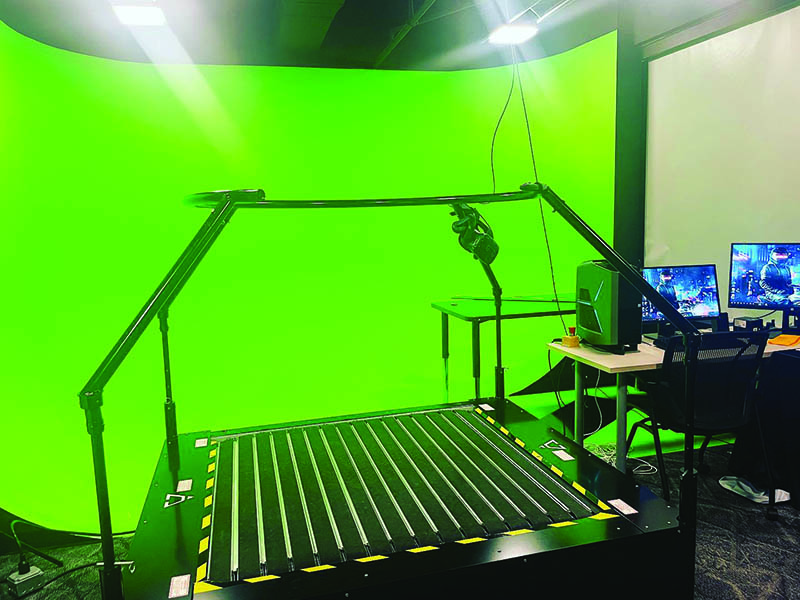
As team captain, SSgt Shanahan leads from within the game, maintaining a positive mindset and competitive drive, not only for himself, but for other Marines on the team. When practicing against rival teams in scrimmages, it’s easy to feel the need to come out on top. SSgt Shanahan reminds his teammates that, while winning is the goal, it doesn’t always help the group play better as a team.
“A lot of people view scrimming as ‘You need to slam every team you play’… when in reality it doesn’t really matter,” he said. “If we win every map, but we’re not learning from anything, the practice was pointless. Don’t get me wrong. I don’t like losing, but those are the practices we learn a lot from. We always try, at least when we’re scrimmaging now and we’re booking scrims, to find a team that’s just maybe one or two steps ahead of us so we can learn from them.”
In esports, players also utilize a gamertag, similar to a “call sign,” to identify themselves and others on different teams. These players often have a personal connection to these names. Like other Marines at MCG, SSgt Shanahan uses a gamertag when he competes. SSgt Shanahan’s gamertag symbolizes his connection to the “Origins” map in Call of Duty Black Ops II’s “zombies” mode. “When I first really started streaming [on Twitch], I played zombies a lot. My favorite map was Origins, and I was really good at it,” he said. “I called myself a God at the map, so my gamertag became ‘Zach_theOG’, Zack the Origins God.” While there is no official rule in creating a gamertag, typically the goal is for the name to be concise, and intimidating. “We recently played the Royal Air Force and one of their player’s names was … Fluffy Hippo, and that name doesn’t scare anybody,” SSgt Shanahan said. “One of our players just changed his gamertag last year. It used to be ‘IconicXLegends,’ which also doesn’t scare anybody. He changed it to ‘Mills.’ Short, sweet, and way more intimidating.”
In addition to his work as a team captain, SSgt Shanahan has taken on coaching responsibilities within the MCG Call of Duty community. In May 2023, a team of Marines traveled to Toronto, Canada, to participate in the Call of Duty League tournament hosted by Toronto Ultra, a professional Canadian Call of Duty esports team. SSgt Shanahan represented the Corps as a coach, instructing a team of four other Marines on the standing team roster. But coaching is more than just knowing the game. The job of the coach extends outside of the in-game role of the team captain.
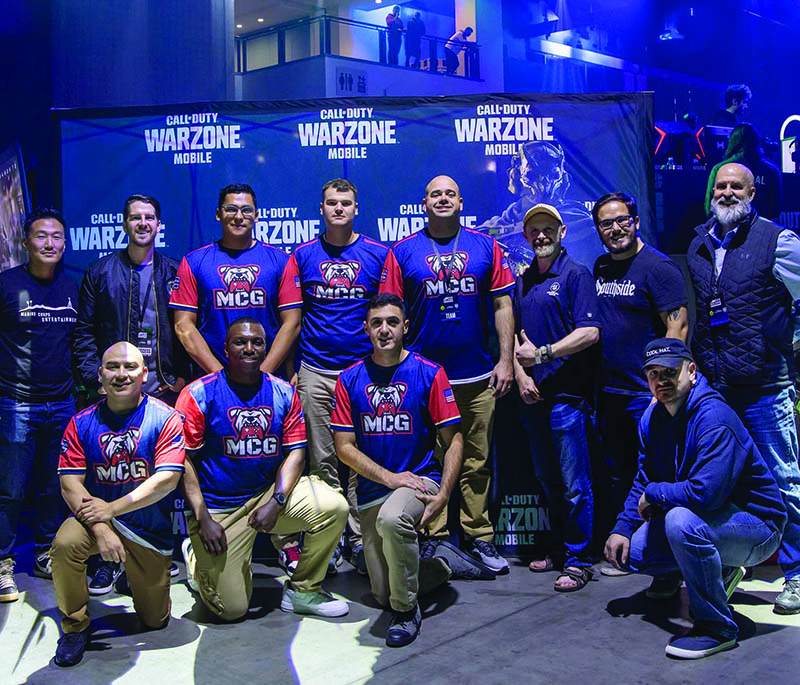
“Coaches have to not only be experienced in the game but be able to manage a team inside and outside of a video game,” said SSgt Mills. “It takes an exceptional level of maturity to be able to coach because not only are you managing a team inside a game, understanding how the game functions, and how the team functions inside of a game, but you’re also expected to manage personnel … that requires a level of tact and expertise that I would expect a senior NCO or a staff NCO to have.”
At times, esports coaches end up managing more than coaching, and this is also true for coaches at MCG, especially when organizing and clearing Marines to attend events. Ensuring that team members have approval from their command, have adequate leave, and have no administrative issues are just a few of the things coaches do to support their standing team members.
Aside from virtual community spaces like Discord, MCG also encourages its members to meet their fellow Marine gamers off-screen, in places like the USO Quantico Gaming Center, which opened Feb. 17, 2022. The gaming center acts as a community hub for Marines to relax and game with fellow servicemembers. Present at the grand opening ceremony was Sergeant Major Troy E. Black, 19th Sergeant Major of the Marine Corps, who spoke to Marines about the evolution of gaming and its importance in connecting Marines with their brothers and sisters in arms. The center houses multiple computers built to run high resolution games, virtual reality machines, tabletop arcade games and more.
The organization is also in the process of becoming officially endorsed by the Marine Corps, which could open opportunities for Marines to be evaluated and improve upon their Marine Corps competencies while participating in an activity that they have a deep-seated passion for. Marine Corps Gaming envisions a future where gaming enabled training tools can be utilized to increase force readiness and lethality while supporting Marines and their quality of life by utilizing resources like the Morale, Welfare and Recreation (MWR) program, the Single Marine Program (SMP) and Marine Corps Community Services (MCCS). But despite the potential training and resource benefits that an endorsement could provide, MCG is and has always been a community space for Marine gamers to share their love for video games, not to replicate combat in any way.
“We’re not using video games to replace the war fighting function that Marines do,” SSgt Mills said. “It’s an entertainment medium. At best it can be a training medium, but it will never replace the realism of warfare, and we’ll never aim to do that in this community.”
Instead, MCG looks to innovate ways to incorporate new players with seasoned competitive gamers. One of those avenues involves the creation of “game academies” for high traffic games. These academies are designed to help new players build the skills they need to compete while working toward a spot on one of the competitive rosters that represent the Corps at tournaments and other gaming-related events.
“Anybody can join the organization, it’s welcome to all. If you want to play, you’ll get your shot to play,” said SSgt Shanahan.
MCG’s goal is to build a community and foster camaraderie among fellow Marine gamers. Whether Marines join to play casually or on a competitive roster, MCG is an organization that encourages its Marines to communicate and work together. It’s also an organization that challenges Marines to push themselves and to constantly strive for improvement.
But most importantly, MCG works to break down barriers and create an even playing field for all Marines who call themselves gamers. At MCG, it doesn’t matter who you are, where you’re stationed or why you decided to join. It’s the work you put in and the connections you make that count. In the years since its inception, MCG has solidified itself as a platform for Marines to expand upon what the Corps has taught them and show the best versions of themselves to each other and any opposing team they face.
Author’s bio: Briesa Koch currently works as an information professional at the Richmond Public Library and is earning her MLIS at Old Dominion University with a concentration in archives and special collections. Koch is a former editorial assistant for Leatherneck.




